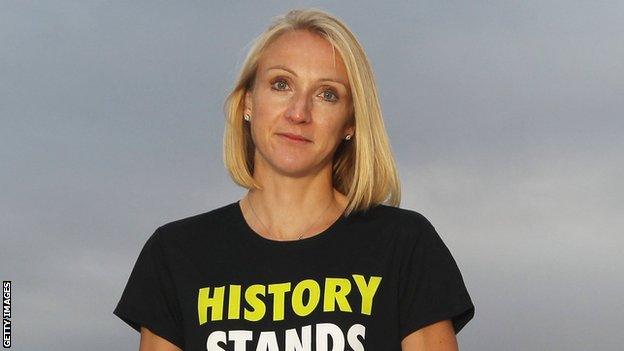Paula Radcliffe says Operation Puerto blood must be saved
- Published

British distance runner Paula Radcliffe has criticised a Spanish court's decision to destroy evidence seized in police raids on Eufemiano Fuentes.
The Operation Puerto doctor received a suspended one-year jail sentence for his role in the blood doping scandal.
Radcliffe said it was "vital" the bags of blood were preserved, adding that Spain had been given a chance to show it backed the fight against drugs.
"In fact they have basically gone in the opposite direction," she said.
Fuentes was convicted over his role in supplying blood transfusions to professional cyclists but was charged under public health laws because doping was not illegal in Spain at the time.
During the trial, Fuentes said that in addition to cyclists he had also worked with athletes, footballers and boxers, although he did not say whether he had helped them dope.
The court's decision to destroy the blood bags and other evidence rather than retain them for analysis, has been widely condemned, with British tennis number one Andy Murray questioning whether it was part of a "cover-up" and both the Spanish anti-doping agency and the World Anti-Doping Agency (Wada) considering appeals over the matter.
Marathon world record holder Radcliffe, 39, is a long-standing opponent of doping, having staged a placard protest against "EPO cheats" at the World Athletics Championship in 2001., external
She pointed out that the court's decision comes at a time when progress is being made in the fight against the use of drugs in sport.
"It is very frustrating when globally the momentum is moving towards supporting anti-doping in a very positive direction with the actions of Usada [United States Anti-Doping Agency] and the recent clean-up in cycling," she told BBC Sport.
"The Spanish haven't used the opportunity they had to make sport a lot cleaner and to improve their reputation in the field of anti-doping.
"There are 211 blood bags in question, probably relating to about 35 different people.
"It could be massive if we could have that information and it exposed those cheats, but also used the fact that we would be opening this up and exposing them as a huge deterrent."
Radcliffe suggested the decision could damage Spanish capital Madrid's bid for the 2020 Olympics.
The head of the International Olympic Committee's medical commission, Arne Ljungqvist, has spoken out against the court's order.
Other IOC members have stated privately they believe it will count against Madrid's 2020 bid and Radcliffe said it was "fair" to suggest that would be the case.
"The Spanish anti-doping agency is only just bringing into line its national legislation with the rest of the world to make it a criminal offence to take part in doping and to supply doping, and that was probably done to support the bid to host the Olympics in 2020," she said.
"This certainly could have supported that a whole lot more and made it look as though Spain was being tough and coming with the rest of the world on anti-doping.
"Instead, it looks like they've gone against it."
- Published1 May 2013
- Published1 May 2013
- Attribution
- Published30 April 2013
- Published30 April 2013
- Attribution
- Published29 January 2013